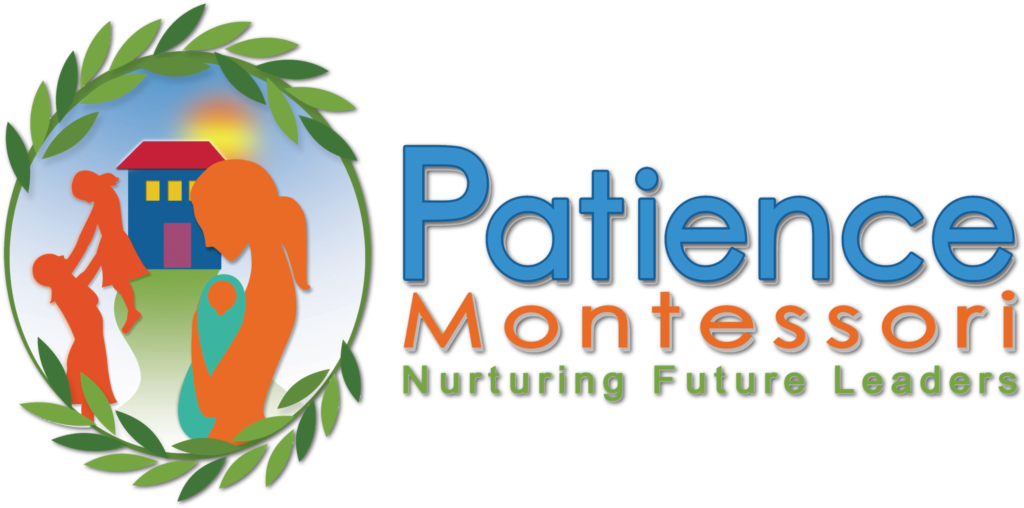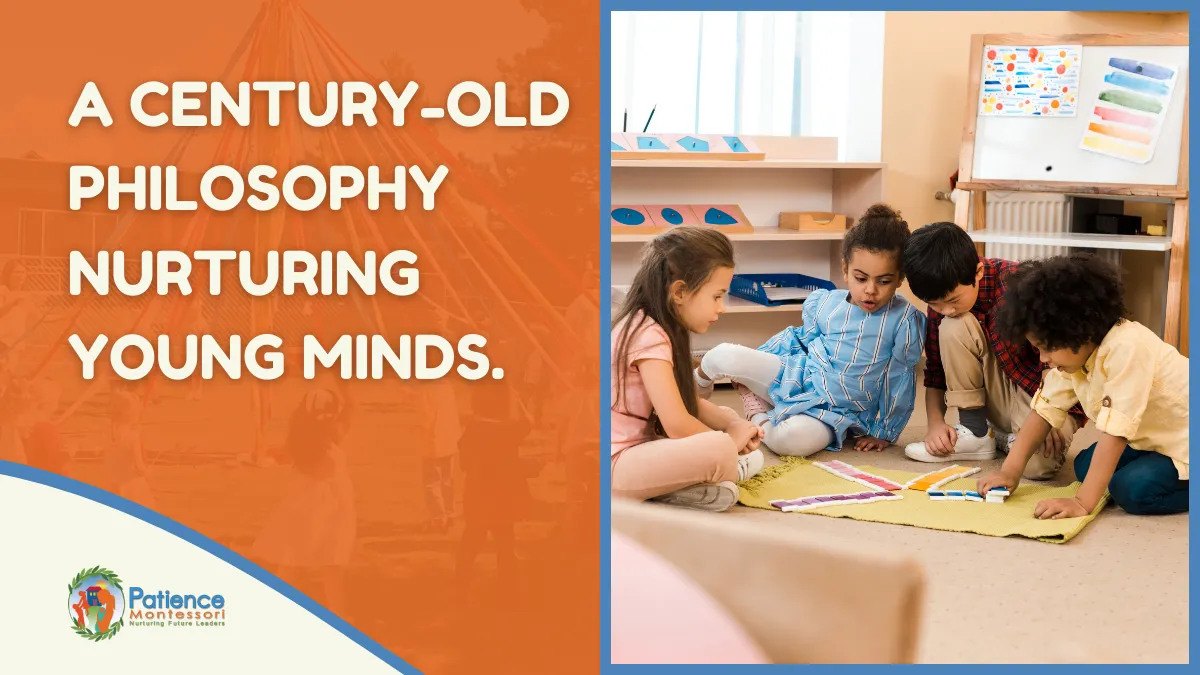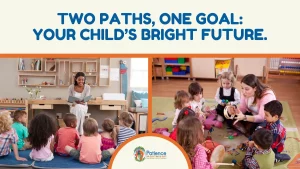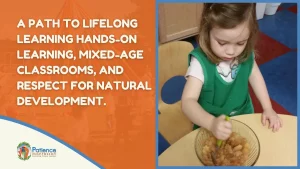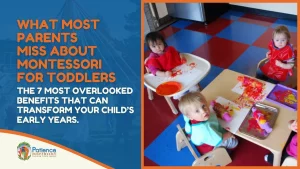When you envision your child’s first years of school, you may picture more than ABCs and 123s—you imagine them brimming with confidence, curiosity, and empathy. What if there were an approach to education built not just to teach facts, but to foster remarkable human beings fully prepared for our changing world? For families seeking something extraordinary, Boulder Montessori schools are the ultimate launchpad.
For over a century, Montessori education has quietly shaped creative thinkers, trailblazing innovators, and compassionate leaders around the globe. Although our focus will be on Boulder in this blog, the wisdom of the Montessori method transcends geography. If you’re weighing the best start for your young child, here’s why Montessori remains the smartest choice, year after year.
Montessori Preschool Boulder: A Philosophy That Trusts Children
Imagine a classroom where children are genuinely trusted to shape their own learning journey. At the heart of the Montessori philosophy is the belief that every child is born with a natural drive to explore, learn, grow, and contribute to the world around them. Instead of viewing children as empty vessels to be filled with knowledge, Montessori educators honor and nurture each child’s unique potential, abilities, and curiosity.
This approach was pioneered by Maria Montessori, the first female physician in Italy, who dedicated her life to understanding how children learn best. Through careful observation, she discovered that when provided with thoughtfully prepared environments and hands-on, meaningful materials, children develop focus, joy, independence, and a deep love of learning. Montessori classrooms encourage children to make choices, solve problems, and work at their own pace, fostering both autonomy and confidence.
Today, Montessori schools around the world build on these principles, emphasizing respect for the child, collaboration among peers, and purposeful learning experiences. This timeless philosophy continues to ignite curiosity, foster creativity, and inspire a new generation of learners to pursue their full potential.
Environments That Unlock Potential
Step into a Montessori classroom, and you’ll immediately notice it’s unlike a traditional learning space. Every detail is intentionally designed to foster growth, independence, and a love for learning. Here’s what makes it so special:
Freedom with Structure
Montessori classrooms prioritize a balance between choice and boundaries. Children are free to move around the room, select activities that spark their curiosity, and establish their own routines.
However, this freedom operates within clear, respectful limits, teaching children self-discipline and an awareness of others. This structure allows them to develop independence while also building a sense of mutual respect and community.
Beauty and Order
The environment is calm, inviting, and thoughtfully organized. Materials are displayed neatly on low shelves, all within a child’s reach, encouraging hands-on exploration and autonomy.
There’s a natural sense of order and aesthetic beauty—from the carefully chosen color palette to the uncluttered layout—designed to help children remain focused and engaged in their work. The calming atmosphere supports both concentration and emotional well-being.
Real-World Tools
Montessori classrooms include real, functional objects instead of traditional “play” items. Glass pitchers are used for pouring water, child-sized knives for slicing fruit, and natural materials like shells and stones for science exploration.
These purposeful tools enable children to practice real-life skills, building confidence, coordination, and a sense of responsibility. By mastering tasks like pouring, cutting, or cleaning up spills, children cultivate practical life skills and take pride in their capabilities.
Montessori environments are far more than classrooms—they are carefully curated spaces that empower children to take ownership of their surroundings. In these settings, children learn to care for their materials, their peers, and themselves. The result is a profound sense of confidence, responsibility, and a lifelong love of learning.
Teachers Who Guide, Not Instruct
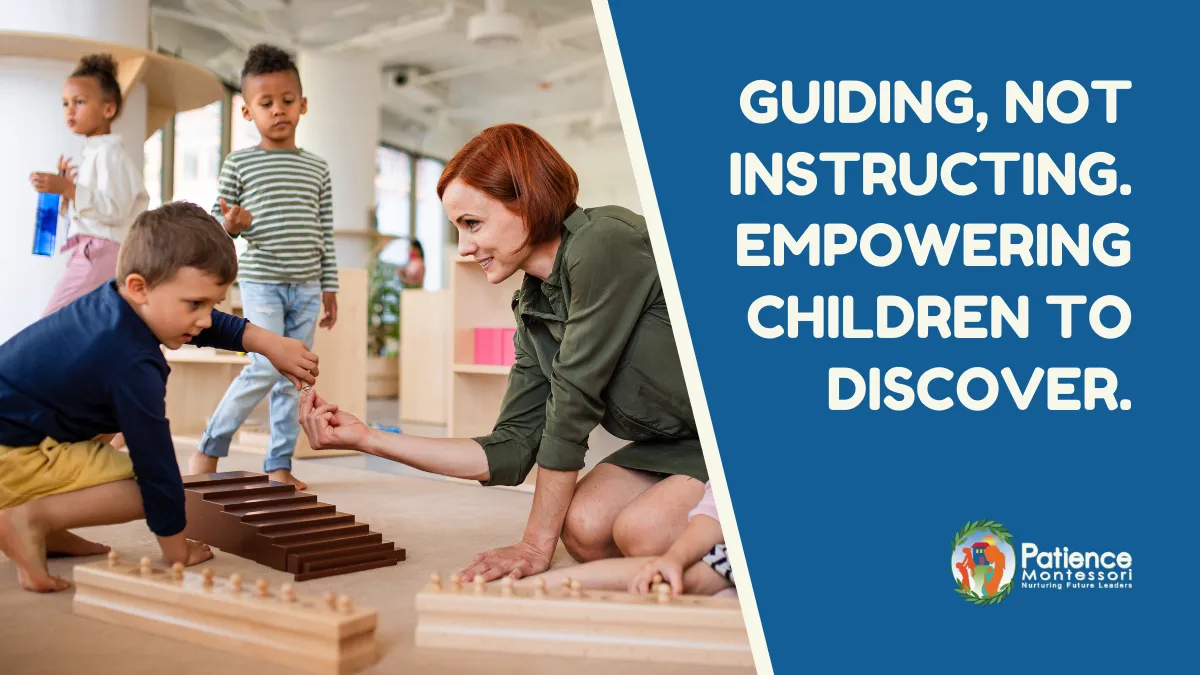
In Montessori education, teachersMontessori education, teachers are often called “guides,” and for good reason. Rather than standing at the front and leading the entire class through the same lessons, guides observe each child’s interests and development, offering individual or small-group lessons at just the right moment.
Montessori guides are experts in stepping back—allowing children to experience challenge, repeat work, and reach “aha!” moments on their own. This subtle art builds resilience and true mastery, not just superficial recall.
Fostering Social Intelligence—Every Day
Montessori classrooms are miniature societies. Children help one another, resolve conflicts, and collaborate on big work. Here, social-emotional learning isn’t taught as an add-on; it is seamlessly woven into daily life.
Children as young as three practice grace and courtesy, learning to greet each other, wait their turn, and express themselves clearly and kindly. By observing older classmates, younger children imitate positive behaviors, while older children develop empathy and leadership skills through mentorship.
A Modern Answer to Childhood in a Fast-Paced World
In today’s fast-moving world, many parents worry about over-scheduling, excessive screen time, and the diminishing role of play in their children’s lives. Montessori education offers a thoughtful and balanced alternative, focusing on fostering independence, curiosity, and emotional well-being through intentional practices:
- Deep Work: Instead of constant task-switching, children are encouraged to immerse themselves in activities for extended periods. This approach strengthens their ability to focus, promotes perseverance, and nurtures a sense of accomplishment as they work through challenges at their own pace.
- Connection to Nature: Many Montessori schools place a strong emphasis on outdoor exploration and hands-on learning in nature. From planting and tending gardens to observing insects and seasonal changes, children learn to appreciate and connect deeply with the natural world, making it an active and cherished part of their education.
- Mindfulness Built-In: Montessori environments intentionally incorporate tools and spaces to promote emotional regulation and self-awareness. With peace corners, breathing exercises, and guided moments of reflection, children are equipped to develop healthy strategies for dealing with big feelings.
In a Montessori setting, childhood is intentional, joyful, and enriched with opportunities for learning and growth—providing a sense of purpose and calm in an otherwise rushed and chaotic world.
Montessori and the “Whole Child” Approach
Traditional education often focuses on academic benchmarks. Montessori education, on the other hand, is dedicated to nurturing the whole child:
- Intellectually
- Socially
- Physically
- Emotionally
Whether learning to tie their shoes or to speak up in group discussions, children grow life skills side by side with academic knowledge.
Research consistently finds that Montessori-educated children demonstrate high levels of social awareness, executive function, and adaptability—traits every parent hopes their child will develop.
Montessori Outcomes: Real-World Success Stories
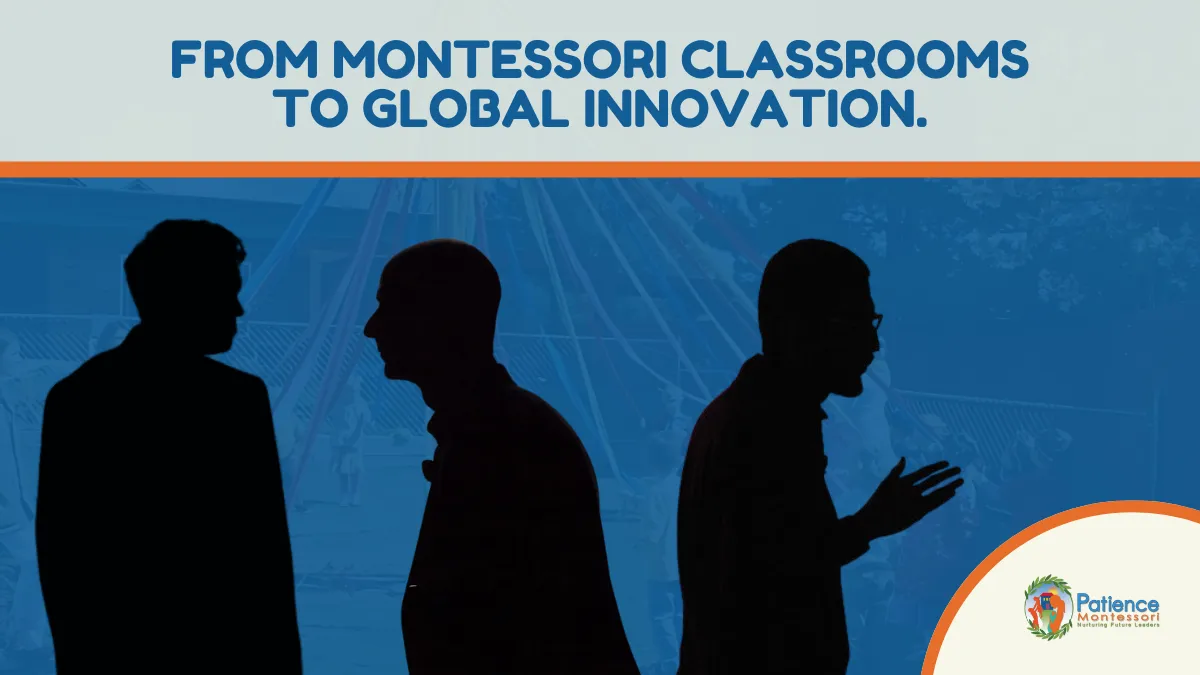
What happens after Montessori? The proof is compelling. Research from the University of Virginia and Loyola University examined Montessori graduates and found that these children often display advanced literacy and math skills, creativity in problem-solving, and a deep love of learning that extends into adulthood. Read the Montessori outcomes study.
Beyond data, the world stage offers inspiring examples: Nobel laureate Gabriel García Márquez, acclaimed chef Julia Child, and tech visionaries like the founders of Google and Amazon all attended Montessori schools. They credit their time in Montessori with sparking independence, curiosity, and out-of-the-box thinking.
But perhaps the most inspiring stories come from everyday families—parents who watch their children grow into confident, caring, and capable young people, excited for each new day of learning.
What Sets Montessori Apart Now and Always
In a time when educational trends rise and fall, Montessori’s principles of respect, independence, and a lifelong love of learning have proven to be both timeless and transformative. As more families seek an education that aligns with their values and nurtures the whole child, Montessori offers a unique and enduring approach:
- Global Communities: Montessori is far from a niche practice; it’s a global movement with schools in nearly every corner of the world. Whether you’re in Boulder, Boston, or Beijing, Montessori education provides a consistent framework rooted in dignity, opportunity, and a shared commitment to empowering children. This universal approach fosters a sense of worldwide connection and continuity.
- Parental Partnership: Montessori schools emphasize collaboration with families, recognizing parents as invaluable partners in a child’s learning journey. Through regular progress updates, open communication, and opportunities to engage in decision-making, families play an active role in shaping their child’s educational experience, creating a true sense of community and shared purpose.
- Innovation Without Distraction: While Montessori classrooms embrace new technologies, they do so with care and intention. Any tools introduced are thoughtfully selected to enhance learning rather than distract from it, ensuring that the focus remains on hands-on exploration, critical thinking, and meaningful development.
By blending tradition with thoughtful innovation, Montessori continues to provide a well-rounded, values-driven education that prepares children to thrive in an ever-changing world.
Patience Montessori: Discover the Best Montessori in Boulder for Your Child to Thrive
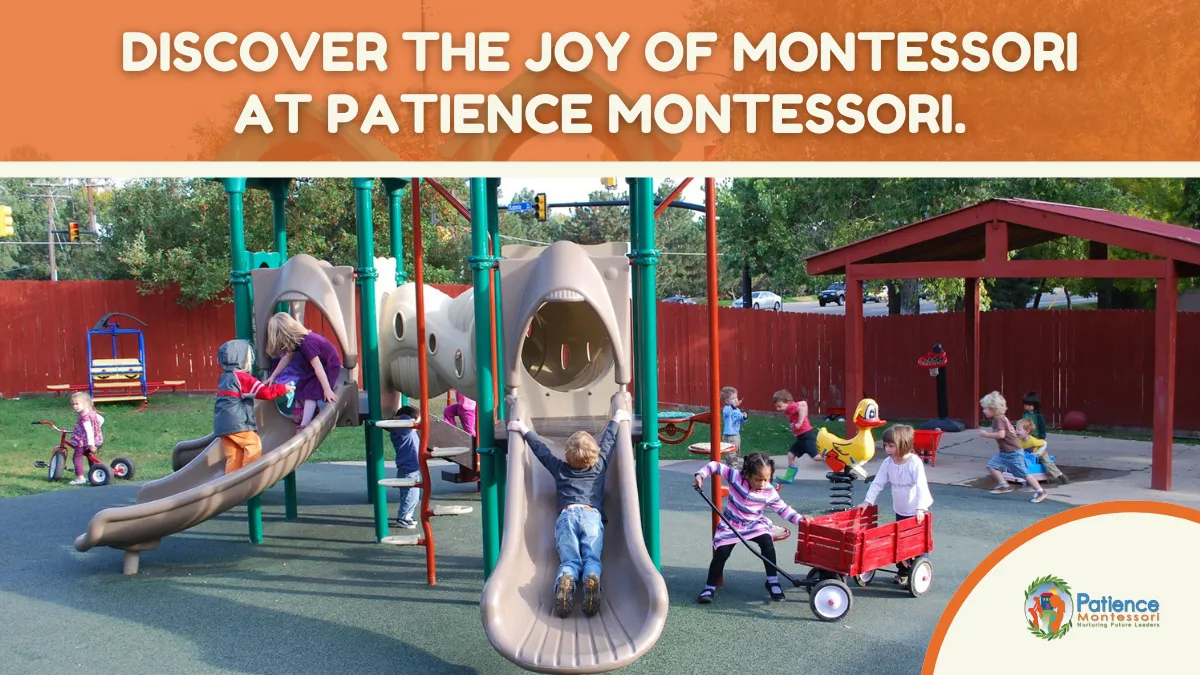
At Patience Montessori in Boulder, we understand how important it is for your child to feel truly known, inspired, and cherished every day. That’s why we’ve created an environment where your child can grow with confidence, curiosity, and joy.
Our state-of-the-art facility, thoughtfully designed learning materials, and dedicated educators provide the perfect setting for your child to flourish. From the moment you step into our classrooms, you’ll notice the calm, focused energy—children fully engaged in meaningful activities, exploring with curiosity, and growing in independence.
At Patience Montessori, your child will do more than learn; they’ll develop into a confident, compassionate individual ready to succeed both now and in the future. Schedule a tour, meet our passionate teachers, and see for yourself what makes our school the ideal place to begin your child’s journey of discovery and success.
